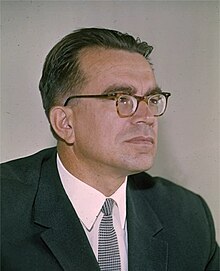You can help expand this article with text translated from the corresponding article in German. (April 2022) Click [show] for important translation instructions.
|
Victor Mikhailovich Glushkov (Russian: Виктор Миха́йлович Глушко́в; August 24, 1923 – January 30, 1982) was a Soviet computer scientist,[1] the founding father of information technology in the Soviet Union and one of the founding fathers of Soviet cybernetics.
Victor Glushkov | |
|---|---|
 | |
| Born | August 24, 1923 |
| Died | January 30, 1982 (aged 58) |
| Alma mater | Rostov State University |
| Known for | Pioneer of Soviet Computing Glushkov's construction algorithm |
| Awards | Lenin Prize, USSR State Prizes,
IEEE Computer Pioneer Award |
| Scientific career | |
| Fields | Cybernetics, control theory |
| Institutions | Institute of Cybernetics, Kyiv |
| Thesis | Locally Nilpotent Torsion-Free Groups with the Conditions of Breakage for Some Chains of Subgroups (1951) |
| Doctoral advisor | Sergei Chernikov |
| Website | https://glushkov.su/eng |
Biography
editHe was born in Rostov-on-Don, Russian SFSR, in the family of a mining engineer. Glushkov graduated from Rostov State University in 1948, and in 1952 proposed solutions to Hilbert's fifth problem and defended his thesis at Moscow State University.
In 1956 he began working with computers and worked in Kyiv as a Director of the Computational Center of the Academy of Science of Ukraine. In 1958 he became a member of the Communist Party. In 1962 Glushkov established the famous Institute of Cybernetics of the National Academy of Science of Ukraine and became its first director.
He made contributions to the theory of automata. He and his followers (Kapitonova, Letichevskiy and others) successfully applied that theory to enhance construction of computers. His book on that topic Synthesis of Digital Automata became well known. For that work, he was awarded the Lenin Prize in 1964 and elected as a Member of the Academy of Science of USSR.
He greatly influenced many other fields of theoretical computer science (including the theory of programming and artificial intelligence) as well as its applications in the USSR. He published nearly 800 printed works.
One of his great practical goals was the creation of the National Automated System for Computation and Information Processing (OGAS), consisting of a computer network to manage the allocation of resources and information among organizations in the national economy, which would represent a higher form of socialist planning than the extant centrally planned economy. This ambitious project was ahead of its time, first being proposed and modeled in 1962. It received opposition from many senior Communist Party leaders who felt the system threatened Party control of the economy.[2] By the early 1970s official interest in this system had ended.
Glushkov founded a Kyiv-based Chair of Theoretical Cybernetics and Methods of Optimal Control at the Moscow Institute of Physics and Technology in 1967[3] and a Chair of Theoretical Cybernetics at Kyiv State University in 1969.[4] The Institute of Cybernetics of the National Academy of Science of Ukraine, which he created, is named after him.
Honors and awards
edit- Member of the National Academy of Science of Ukraine since 1961.[5]
- Member of the USSR Academy of Sciences since 1964.[6]
- Member of the German Academy of Sciences Leopoldina since 1970.[7]
- Lenin Prize, 1964
- Order of Lenin, 1967, 1975
- USSR State Prize, 1968, 1977
- Hero of Socialist Labor, 1969
- Ukrainian State Prize, 1970, 1981
- Order of the October Revolution, 1973
- Computer Pioneer Award (IEEE), For digital automation of computer architecture, 1996.[8]
See also
editReferences
edit- ^ Victor Glushkov in Great Soviet Encyclopedia
- ^ Peters, Benjamin (2016). How Not to Network a Nation: The Uneasy History of the Soviet Internet. The MIT Press. ISBN 9780262034180.
- ^ The history of the MIPT Division in Kyiv Archived 2007-08-14 at the Wayback Machine
- ^ Malinovskiĭ, BN (1993). Academician V. Glushkov (in Russian). Kyiv: Naukova Dumka. ISBN 5-12-003983-9.
- ^ Victor Glushkov Archived 2008-04-17 at the Wayback Machine. Site NASU
- ^ Victor Glushkov. Site RAS
- ^ "List of Members". Archived from the original on 2017-10-04.
- ^ Computer Pioneer Recipients